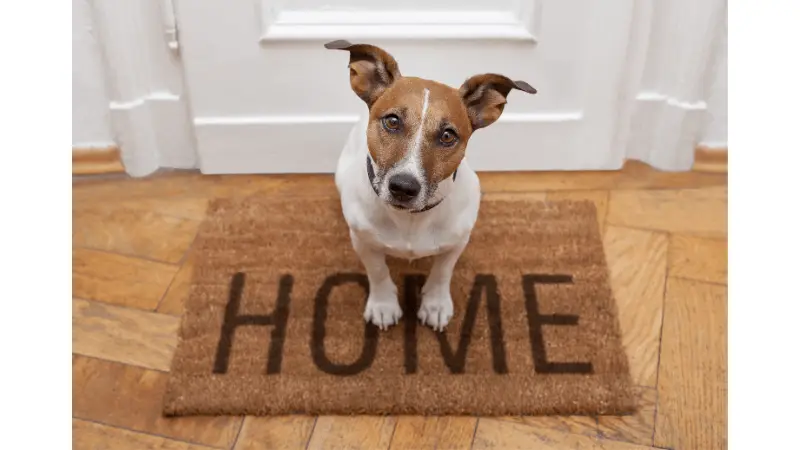Visiting your dog after rehoming can be emotionally challenging. It requires considering the well-being of the dog and your feelings.
Deciding to visit a rehomed dog is not straightforward. Owners often grapple with the fear of confusing the pet or disrupting their adaptation to the new environment. On the flip side, seeing a former owner can offer closure for both the dog and the individual.
It’s essential to evaluate the potential impact on the dog’s behavior, the new owner’s preferences, and your emotional state. Addressing these factors ensures that the decision to visit aligns with the best interests of the dog, easing the transition for all parties involved. This topic resonates with many pet owners facing the tough choice of rehoming and the emotional aftermath that follows.
Pros Of Visiting Your Dog After Rehoming
Deciding to rehome a beloved pet is never easy. But visiting your dog after rehoming can bring numerous benefits.
Maintaining A Connection
Staying in touch with your dog is possible even after rehoming. Visits can help maintain the bond you share. Dogs have excellent memories when it comes to their people. Seeing a familiar face can remind them of the love and care they always received. Although they are in a new home, these visits can strengthen the emotional link.
Providing Comfort And Familiarity
Being in a new environment is stressful for any dog. Visiting can provide a sense of comfort and familiarity. It reassures them that they are still loved and haven’t been forgotten. Often, the previous owner’s presence can ease the transition. It’s a way to show support as they adjust to their new family.
- Sees familiar faces
- Feels continued love
- Stress levels may drop
Cons Of Visiting Your Dog After Rehoming
When you rehome your beloved dog, the decision is never easy. One might consider visiting their former pet in the new home. But this action has potential drawbacks. It’s essential to understand the cons before choosing to visit.
Confusing The Dog
Dogs create strong emotional ties with their owners. Your visit could reignite this bond and confuse your dog. They might not understand why you’ve returned and then left again. This turmoil can lead to stress and behavioral issues, as your dog struggles with these mixed signals.
Impeding The Transition Process
Transitioning to a new home is an adjustment for any dog. Your presence can impede this critical period. The dog must learn to trust and bond with the new owners. Your visit could slow down this process, potentially causing the dog to feel divided loyalties, which can be hard for both the dog and its new family.

Alternative Ways To Stay Connected
Rehoming your dog can be a tough decision. But staying connected can ease the transition. Here’s how.
Regular Communication With The New Owners
Set a communication schedule with the new owners. Discuss comfort levels for both sides. Start with weekly or monthly check-ins.
Emails, texts, or calls can work. Respect the new owner’s space and privacy. Remember, clear boundaries are key to maintaining a healthy connection.
Providing Updates And Photos
Ask the new owners if they’re willing to share your dog’s milestones. Be delighted when you receive photos and stories about your former pet’s new adventures.
Offer to do the same if they’re open to it.
- Receive photos: Celebrate the joy your dog is experiencing.
- Share memories: Keep a scrapbook or digital album of updates.
Considerations Before Deciding To Visit
Letting go of a beloved pet is never easy. The decision to visit a rehomed dog can be just as tough. Before taking that step, assessing the impact on all affected parties is crucial. Careful thought ensures the best outcome for your furry friend and their new family.
The Emotional Well-being Of Your Dog
Dogs form strong bonds with their owners. Seeing a previous owner might confuse them. Assess your dog’s ability to cope with the visit. Would it stir up emotions or disrupt their new bond?
Key factors to consider include:
- Adaptation: Has your dog adjusted to their new home?
- Time: Enough time should pass to minimize confusion.
- Behavior: Observe changes in behavior post-rehoming.
The New Owners’ Preferences
Building a relationship with the new owners is essential. Respect their routine and wishes for the dog. Is a visit something they’re open to?
Important aspects include:
- Communication: Engage in clear, honest conversations.
- Boundaries: Every owner sets different limits. Respect them.
- Future Visits: Discuss the possibility without expectations.
Final Thoughts
Deciding to visit a rehomed dog is tough. The final choice touches hearts and minds. This post has explored key considerations. Let’s sum things up.
Weighting Personal Needs And Dog’s Best Interest
Balance is crucial in this decision. Your emotions are important. Your dog’s well-being is too. Think about these:
- Will the visit confuse your dog? Dogs may not understand short-term visits after being rehomed.
- Are you ready to see your pet in a new home? It might be harder than you expect.
- Is the dog settled? A visit might upset their new routine.
Seeking Professional Advice
It’s wise to chat with a vet or pet counselor. They know lots about pet behaviors and emotions. Their tips can guide you. Consider making a list:
| Your Feelings | Dog’s Well-being | Expert Advice |
|---|---|---|
| You might miss your dog a lot. | Your dog might be happy in a new place. | Experts can offer insight. |
| Seeing your dog again might bring joy. | Change might stress your dog. | Advice can shape a smart choice. |
Rely on expert guidance when in doubt. Your love for your pet is clear. Making the best choice shows that love.
Frequently Asked Questions Of Should I Visit My Dog After Rehoming
Is Visiting A Rehomed Dog A Good Idea?
Visiting a rehomed dog can be comforting but may confuse the pet. It’s vital to consider the dog’s adjustment period and well-being. If it impedes their ability to settle in with the new family or causes stress, it’s best to refrain.
How Soon Should I Visit My Rehomed Dog?
It’s recommended to wait several months before considering a visit. This allows time for the dog to establish a bond with their new family. Again, the pet’s adjustment should be the priority in deciding the timing of any visit.
What Are The Benefits Of Visiting Rehomed Dogs?
The primary benefit of visiting a rehomed dog is emotional closure. It can help both the former owner and the dog find peace. However, ensure such visits are positive and do not disrupt the dog’s new life and routine.
Can Visiting A Rehomed Dog Cause Negative Behavior?
Yes, visiting a rehomed dog can potentially trigger negative behaviors. It may cause confusion, anxiety, or disrupt the acclimation process with the new owner. Always consult the new owner and a vet or behaviorist before planning a visit.
Conclusion
Deciding to visit a rehomed dog involves deep reflection. Balance emotional well-being, the pet’s adjustment, and the new owner’s views. Each scenario differs, so judge based on mutual comfort and the dog’s best interest. Ultimately, thoughtful consideration ensures peace of mind for everyone involved, including your beloved canine companion.
Read also: 5 Tips From a Rat Control Expert in Pasadena




